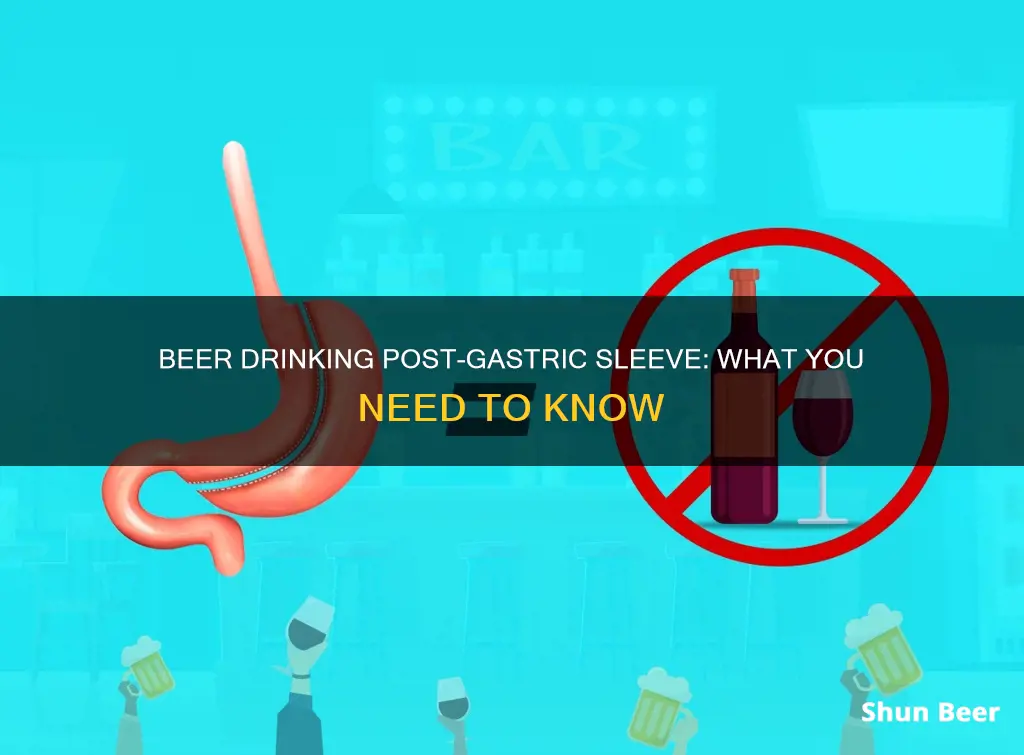
Drinking beer after a gastric sleeve procedure is not recommended for at least six months, as alcohol can inhibit blood flow and prevent wounds from healing properly. After this period, it is possible to reintroduce beer and other alcoholic drinks, but it should be done gradually and responsibly. Weight loss surgery affects metabolism, meaning blood alcohol levels rise more quickly, and patients are more susceptible to hypoglycaemia. Alcohol is also nutritionally empty and can quickly offset weight loss progress.
| Characteristics | Values |
|---|---|
| Drinking beer after gastric sleeve surgery | Not recommended for the first 6 months after surgery |
| Drinking on an empty stomach | Can lead to nausea and vomiting |
| Calories in beer | Light beer has around 100 calories |
| Alcohol absorption | Faster after surgery |
| Blood sugar | Alcohol consumption can lead to low blood sugar |
| Addiction transfer | Possible, but a small percentage of patients are affected |
| Carbonation | Can irritate and stretch the stomach |
| Nutritional value | Alcohol has few nutritional benefits |
What You'll Learn
- Drinking beer after gastric sleeve surgery can irritate your stomach and cause discomfort
- It is advised to wait at least six months after surgery before drinking beer
- Alcohol can lead to low blood sugar and intoxication more quickly after gastric sleeve surgery
- Drinking beer can stretch the stomach and cause long-term complications
- Beer is high in calories and sugar, which can offset weight loss progress

Drinking beer after gastric sleeve surgery can irritate your stomach and cause discomfort
It is important to wait until you are fully healed before drinking any alcohol, including beer. This is because alcohol can inhibit blood flow and prevent proper wound healing. Drinking during the recovery period could also cause leaks or infections.
Even after you have fully healed, it is best to avoid beer and other carbonated alcoholic drinks. These can irritate your stomach and cause discomfort. The carbonation can also stretch the skin of your stomach, which can lead to long-term complications.
If you do choose to drink beer after gastric sleeve surgery, it is important to do so in moderation. Beer is high in calories and sugar, which can sabotage your healthy eating plan and offset your weight loss progress. It is also important to remember that your tolerance for alcohol may be lower after gastric sleeve surgery. Even a small amount of beer can be intoxicating and lead to low blood sugar.
Drinking Beer on Kauai Beaches: What's Allowed?
You may want to see also

It is advised to wait at least six months after surgery before drinking beer
Drinking beer after gastric sleeve surgery is not recommended for at least six months. This is because your stomach is still healing during this time, and alcohol can inhibit blood flow and proper wound healing. Drinking too soon could also cause leaks or infections.
After gastric sleeve surgery, your metabolism is altered, and blood alcohol levels rise more quickly and intensely than before. This means that even a single drink can cause intoxication. It is important to be aware of this increased sensitivity to alcohol and to monitor your alcohol limit carefully.
In addition, gastric sleeve surgery reduces the amount of food you consume while drinking alcohol, which further expedites the absorption of alcohol into the bloodstream. This can lead to low blood sugar or hypoglycemia, which can be dangerous and even life-threatening if not treated promptly.
To minimise the risks associated with drinking beer after gastric sleeve surgery, it is best to wait at least six months before consuming any alcohol. During this time, you can focus on your recovery and adjusting to your new diet and lifestyle. This will also allow your body to heal without the potential complications that alcohol can cause.
Once you have reached the six-month mark and have consulted with your doctor, you can reintroduce alcohol gradually and responsibly. It is important to avoid sugary and carbonated drinks, as these can irritate your stomach and stretch the gastric pouch. Instead, opt for clear drinks with minimal sugar, such as vodka soda or light beer. Always drink alcohol with food to help slow down absorption and be mindful of your caloric intake. Remember that even small amounts of alcohol can lead to intoxication and low blood sugar, so it is important to sip slowly and monitor your body's response.
Beer and Cyrios: What You Need to Know
You may want to see also

Alcohol can lead to low blood sugar and intoxication more quickly after gastric sleeve surgery
Drinking alcohol after a gastric sleeve procedure is not recommended, but it is also not completely banned. However, there are some important factors to consider. Firstly, it is advised to wait at least six months after the surgery before reintroducing alcohol, as it can inhibit blood flow and prevent proper wound healing. During this initial period, drinking could cause leaks or infections.
After gastric sleeve surgery, your metabolism is altered, and blood alcohol levels rise more quickly. This means that even a single drink can lead to intoxication. Weight loss surgery also results in reduced glycogen in the body, and consuming alcohol further depletes glycogen, which can lead to low blood sugar or hypoglycemia. Symptoms of hypoglycemia include slurred speech, confusion, loss of coordination, and poor vision. If you experience these symptoms, it is important to raise your blood sugar levels by consuming a glucose tablet or diluted juice, followed by a snack with protein and complex carbohydrates.
To minimise the risks associated with alcohol consumption after gastric sleeve surgery, it is recommended to:
- Avoid carbonated and sugary drinks, as they can irritate and stretch the gastric pouch.
- Drink alcohol with food to slow absorption into the system.
- Be mindful of the caloric content of alcoholic beverages.
- Drink in moderation, as excessive consumption can offset weight loss progress.
- Be aware of your alcohol limit and do not exceed it.
- Never drink and drive.
Paxlovid and Beer: Is It Safe to Mix?
You may want to see also

Drinking beer can stretch the stomach and cause long-term complications
Drinking beer and other carbonated alcoholic drinks can irritate your stomach after gastric sleeve surgery. The bubbles can stretch the skin of your stomach, causing discomfort and long-term complications. This can include a reversal of the changes made during the original surgery.
Stretching the stomach is counterproductive to the goal of bariatric surgery, and another surgery may be needed to reverse the damage. Binge drinking accelerates stomach stretching, which is one of the main causes of inadequate weight loss after gastric sleeve surgery.
It is recommended that you avoid carbonated drinks after gastric sleeve surgery. This is because they can cause more bloating and discomfort due to your smaller stomach.
After gastric sleeve surgery, your metabolism is altered. This causes blood alcohol levels to peak higher and take longer to return to normal. Even a single drink can elevate your blood alcohol level to the point of legal intoxication.
Therefore, it is recommended that you do not drink alcohol for at least six months following weight loss surgery. If you do decide to drink after surgery, you must learn how your body reacts to alcohol and always have a designated driver.
Beer and Penicillin: A Dangerous Mix?
You may want to see also

Beer is high in calories and sugar, which can offset weight loss progress
Drinking beer after gastric sleeve surgery is not recommended due to the high calorie and sugar content of beer, which can negatively impact your weight loss progress.
Beer is known to be high in calories and sugar, which can offset your weight loss progress after gastric sleeve surgery. Alcoholic beverages, including beer, are considered empty calories, providing little to no nutritional value. A light beer typically contains around 100 calories, while mixed drinks can add several hundred calories to your daily intake. These extra calories can hinder your weight loss efforts and may even lead to weight gain.
Additionally, the sugar content in beer can have similar effects. The high sugar content in alcoholic drinks, especially when mixed with sugary additives, can cause a spike in blood sugar levels and contribute to weight stabilization or even weight regain. This is counterproductive to the goals of gastric sleeve surgery, which aims to reduce food intake and promote weight loss.
Moreover, drinking beer after gastric sleeve surgery can stretch the stomach. Binge drinking or excessive consumption of carbonated alcoholic beverages can accelerate stomach stretching, which is a primary cause of inadequate weight loss after surgery. This could potentially lead to the need for another surgery to reverse the damage.
It is important to prioritize your health and weight loss goals after undergoing gastric sleeve surgery. While drinking beer may be tempting, it is crucial to consider the negative impact it can have on your progress. By avoiding beer and other high-calorie, high-sugar alcoholic beverages, you can maximize your chances of achieving your desired weight loss results.
If you choose to consume alcohol, it is recommended to opt for clear drinks with minimal sugar, such as vodka sodas or light beer. However, even these options should be consumed in moderation, as they still contain calories and can affect your overall weight loss journey. Remember to always consult with your doctor or healthcare provider for personalized advice regarding alcohol consumption after gastric sleeve surgery.
Beer and Sudafed: What You Should Know
You may want to see also
Frequently asked questions
Yes, but it is not recommended. You should wait at least six months after surgery before reintroducing alcohol to your diet. Even then, drinking in moderation is advised, as alcohol is full of calories and can irritate your stomach.
The surgery alters your metabolism, causing blood alcohol levels to rise more quickly. This means it takes less alcohol to reach intoxication.
Drinking can cause leaks or infections, and can also lead to low blood sugar or hypoglycemia. Alcohol is also high in calories and can cause weight gain.
Drink in moderation and always with food. Avoid sugary and carbonated mixers, and be aware of your alcohol limit.







